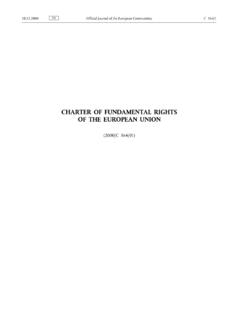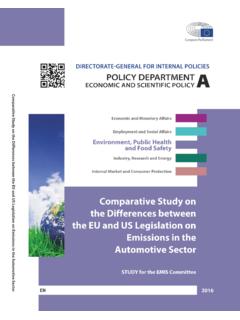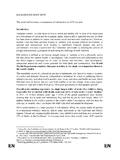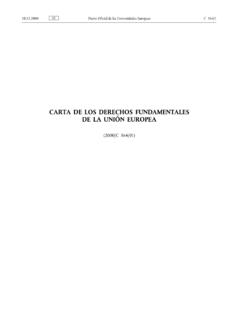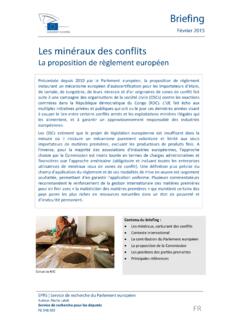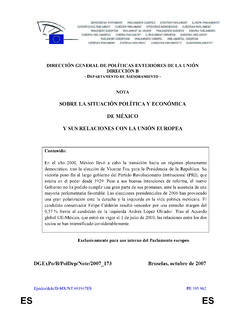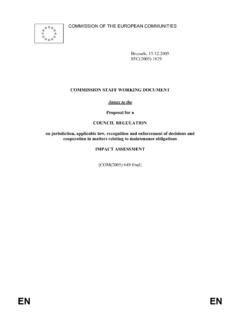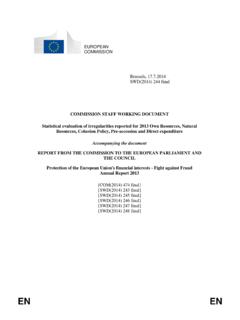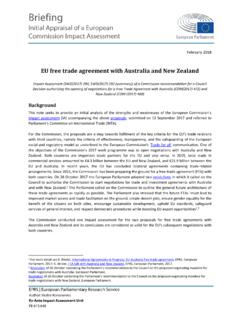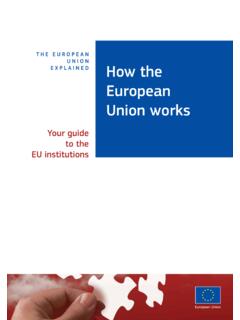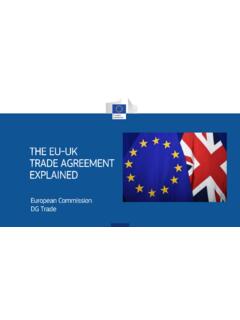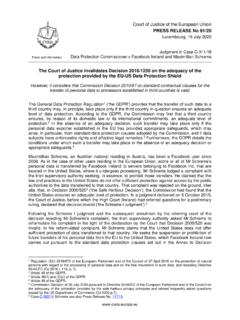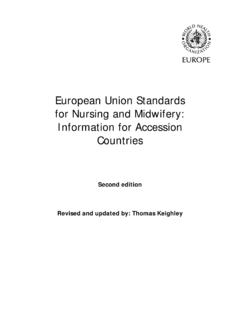Transcription of The CJEU Judgement in the Schrems II ... - European Parliament
1 AT A GLANCE EPRS | European Parliamentary Research Service Author: Hendrik Mildebrath, Members' Research Service PE September 2020 EN The CJEU judgment in the Schrems II case In its July 2020 Schrems II judgment, the Court of Justice of the European union (CJEU) declared the European Commission s Privacy Shield Decision invalid on account of invasive US surveillance programmes, thereby making transfers of pe rsonal data on the basis of the Privacy Shield Decision illegal. Furthermore, the Court stipulated stricter requirements for the transfer of personal data based on standard contract clauses (SCCs). Data controllers or processors that intend to transfer data based on SCCs must ensure that the data subject is granted a level of protection essentially equivalent to that guaranteed by the General Data Protection Regulation (GDPR) and the EU Charter of Fundamental Rights (CFR) if necessary with additional measures to compensate for lacunae in protection of third-country legal systems.
2 Failing that, operators must suspend the transfer of personal data outside the EU. Background The Privacy Shield framework pr o vides for the possibility of lawful transfer of personal data fr o m t h e EU to the United States (US), while ensuring a strong set of data protection requirements and safeguards. On the basis of this framework EU (and later European Economic Area, EEA) businesses were able to legally transfer personal data to US-based companies that were listed in the Privacy Shield list. Admission to this list is administered by the US Department of Commerce, while the US Federal Trade Commission monitors compliance. While participation is voluntary, companies that have been certified are obliged to comply with the Privacy Shield Principles, as they became enforceable under US law.
3 A case of unjustified non-compliance could trigger a case pursuant to section 5 of the Free Trade Commission Act, or lead to the organisation s removal from the Privacy Shield list. The July 2020 ruling is in line with the Court s persistent strengthening of the level of protection in recent years. Notably, the CJEU annulled in 2006 the 2004 Passenger Name Record (PNR) Agreement between the EU and the US, objected to the entry into force of the EU-Canada PNR Agreement in its Opinion 1/15 is sued in 2017 and invalidated the Safe Harbour Decision in the S chrems I judgment in 2015. The Privacy Shield principles became operational as a replacement for the invalidated Safe Harbour principles on 1 August 2016.
4 Although it addressed many of the defects of its predecessor, its remaining privacy la cunae were repeatedly criticised, in particular in a 2018 resolution of the European Parliament and by t he European Data Protection Board (EDPB). In February 2020, the Chair of the Parliament 's Civil Liberties Committee also expressed his concerns after a delegation visit to the United States. The Eu r o pean Commission, by contrast, reaffirmed the mechanism by holding that the US level of data protection was adequate in its 2019 third annual review of the Privacy Shield. Judgment Following the S chrems I judgment, Facebook Ir ela nd explained that it transferred m uch of the data to its US parent company based on SCCs.
5 On 1 December 2015, Max Schrems reformulated his complaint lo dged with the Irish Data Protection Authority (DPA) to the effect that the SCC Decision was not able to ju s t ify the transfer of personal data to the US, since US surveillance programmes interfered with his fundamental rights to privacy, to data protection and to effective judicial protection. In a draft decision, the DPA shared Schrems concerns and brought an action before the Irish High Court , which then made reference to the Court for a preliminary hearing. In the meantime another transfer mechanism, the Privacy Shield Decision, became pertinent to the case, which prompted the CJEU also to rule on the validity of this instrument.
6 On 16 July 2020, the CJEU (i) declared invalid the European Commission s Privacy Shield Decision a nd (ii) affirmed the validity of the SCC Decision while stipulating stricter requirements for SCC-b a s e d t r an sfers. (i) The Court held that the US does not provide for an essentially equivalent, and therefore sufficient, level of protection as guaranteed by the GDPR and the CFR. The legal bases of US surveillance programmes such as PRISM and UPSTREAM are not limited to what is strictly necessary and would be considered a disproportionate interference with the rights to protection of data and privacy (Article 45(1) GDPR, read in EPRS The CJEU judgment in the Schrems II case This document is prepared for, and addressed to, the Members and staff of the European Parliament as background material to assist th em in th eir parliamentary work.)
7 The content of the document is the sole responsibility of its author(s) and any opinions expressed herein should not be taken to represent an official position of the Parliament . Reproduction and transla tion for n on-commercial pu rposes are au th orised, provided th e sou rce is acknowledged and the European Parliament is given prior notice and sent a copy. European union , 2020. (contact) (intranet) ( internet) http://e u ( b l o g) light of Articles 7, 8 and 52(1) CFR), since they do not sufficiently limit the powers conferred upon US authorities and lack actionable rights for EU subjects against US authorities. Contrary to the Eu r o pean Commission s adequacy findings, the O m b u ds ma n mechanism does not remedy, but rather exacerbates these deficiencies, as the mechanism interferes with the right to effective judicial protection (Article 45(1) GDPR, read in light of Article 47 CFR), due to concerns over the independence of the institution and on the enforceability of its decisions.
8 (ii) Additionally, the Court affirmed the validity of the SCC Decision and held that SCCs do not, per se, p resent lawful or unlawful gr o un ds for data tran sfer (no panacea). The CJEU also stipulates that data controllers or operators that seek to transfer data based on SCCs, must ensure that the data subject is afforded a level of protection essentially equivalent to that guaranteed by the GDPR and CFR if necessary with additional measures to compensate for la cun ae in t he pr otect ion of t h ird-count ry legal sy st ems. F ailin g t h at, operators must suspend the data transfer. Supervisory authorities must check transfers and are required t o p r o h ibit t r ans fers where t hey find that data subjects are not afforded essentially equivalent protection.
9 Implications and first reactions Implications for commercial data transfers As a result of the Court s decision, EU companies can no longer legally transfer data to the US based on the Privacy Shield framework. Companies that continue to transfer data on the basis of an invalid mechanism risk a penalty of 20 million or 4 % of their global turnover, pursuant to Article 83(5)(c) GDPR. However, commentators disagree on the broader implications of the Court ruling for operators. Some commentators believe that t he v a st m ajo r it y o f co mpa nies ca n co nt in ue u s in g t h e co nv ent io na l SCCs, w hile others a r g ue t h at co mpa nies s ho u ld if at all only use SCCs for transfers to the US, if (i) they are not subject to the respective surveillance law, or if (ii) they provide for 'additional safeguards'.
10 The DPA of North Rhine-Westphalia pointed out that any co m pan ies using US communication services or transatlantic cables might be subject to US surveillance mechanisms. To salvage SCC-based data transfers, such c o m p a n i e s w ould need to compensate for gaps in protection with so far undetermined 'additional safeguards'. The Court stressed that protective contract clauses are not binding on third parties or authorities and therefore likely to be ineffective, while cryptanalytic and quantum computing efforts of intelligence agencies r aise concerns about the effectiveness of protective technical measures such as encr y ptio n. According to the EDPB and the Conference of the German Data Protection Authorities (DSK), c o m p anies may transfer data based on binding corporate rules, but will have to, equally, ensure the essential equivalence.
